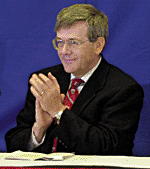Fiorina Hits The Home Stretch In battle To Win Approval For Merger
Just days after the European Union gave a thumbs-up to the deal, HP last week set a shareholder vote on the merger proposal for March 19. All that remains is for Fiorina, HP's chairman and CEO, to secure a majority vote of shareowners, of whom institutional shareholders stand as the swing votes.

\
HP board member Walter Hewlett's proxy bid winds down with the March 19 shareholder vote on the merger.
But getting to that point hasn't been easy. Since HP and Compaq uncorked the merger deal in early September, the approval process has become a political dogfight. In November, board member Walter Hewlett, son of HP co-founder William Hewlett, launched a proxy fight against the deal, saying that big high-tech mergers don't work and that the deal would overexpose HP to the low-margin PC business. Heirs of HP co-founder David Packard and the foundations they control also have joined in opposition to the deal.
As a result, the families controlling roughly 18 percent of HP's outstanding shares are aligned against the merger. And Fiorina admits that she didn't expect such adamant opposition to the deal. "I would not have predicted [Walter Hewlett's opposition. Has that surprised us? Absolutely," she said. "What has not surprised us is that initially people's reactions were negative."
Still, Fiorina believes the deal is starting to win more favor because people are examining it more closely. "This combination is accreted to shareholders," she said. "We baked in revenue loss; we've assumed that we are going to lose $5 billion in revenue. We have a very conservative set of cost synergies. And we are already overachieving against our loss assumptions. These are two businesses coming together in a consolidating industry."
Fiorina noted that the HP-Compaq deal differs from many previous high-tech mergers, which have tended to be "diversification plays" between different businesses that proved unable to meld corporate cultures and unearth cost synergies.
"Other than imaging and printing, HP and Compaq are in exactly the same business," she said. "That means we have an extraordinary opportunity to reduce our cost structure and advance our market position at the same time."
The crux of the merger is to cement HP's and Compaq's market leadership, bolster their services capabilities and broaden their investment in high-growth areas, according to Fiorina.
"Our goal is not necessarily to be the biggest PC player in the world, although we will be," she said. "This merger is about more than PCs. It's about building a professional services organization. It's about an enterprise computing organization that becomes the leading player in Unix, in supercomputing, in Windows, in Linux, in storage. And it's about an imaging and printing franchise that has the ability to invest in new categories that ensure its ongoing growth and profitability."